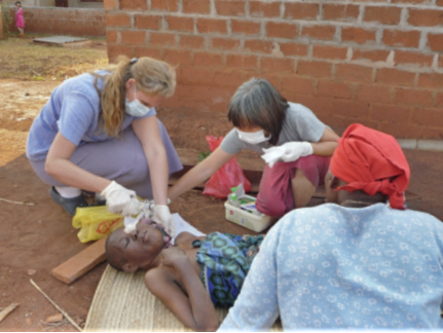Working Ourselves out of a Job! God’s Work in Mozambique
- comms441
- Mar 31
- 3 min read
Stories from the Field, 4 March 2025
Speakers: Anthony and Jennie
How does one reach an unreached people group? And how does one know when the job is done? Anthony & Jennie left Singapore with a child in tow and another on the way with no answers to those questions. 20 years later, they left a fully functioning, mature church in Mozambique, having worked themselves out of a job.

The cheery couple began with their own backstory. After leading very typical lives of Singaporeans and working several years, God led them to an unreached people! In 1996, they left for four years’ preparation under New Tribe Missions (now named Ethno 360) in the USA.
Stages on the Journey

Upon reaching Mozambique, they had one clear aim in mind – they wanted to leave a mature, fully functioning church at the end. Thus, they worked backwards to plan the steps to get there.
Pre-evangelism is all about getting to know the people. Anthony had to build their house from scratch and they needed help from the locals to clear the land and make bricks! They took time to ask the locals about their practices and viewpoints, which helped to gain trust. They also offered two kinds of practical help – medical first aid and transportation needs. This reduced the people’s natural suspicion of strangers, and they were able to build friendships among them.
Language and culture learning was important so that they could speak to the people in their own language. They also wanted to behave in a culturally appropriate manner to show respect to the people.
That was followed by the Bible translation and literacy stage. There was already a Malawi Bible which needed revising as it had been translated some time ago and in a neighbouring country. Anthony and Jennie also felt that literacy was an important step even for oral societies. Although the people could learn from Bible stories, each believer needed to be able to read the Bible and feed themselves from the Word of God. They conducted literacy lessons, and some of the people had to learn to hold pencils! As they did not want to build a church building which would attract persecution, they used a space for literacy classes which they called a ‘school’, and which served as a preaching point too.

Naturally, evangelism and discipleship came next. Eventually, after 17 years, the first believers came to Christ and the church was born. They taught the new believers about aspects of Christian faith such as baptisms and weddings, and also trained some of them to develop a discipleship curriculum and be teachers themselves.

Time to go? When would the church be considered a ‘mature church’? Anthony and Jennie said that the tipping point was when the believers could discern truth from falsehood for themselves by referring to the Word of God. They had walked the believers through various problems including church discipline, and let them work out solutions for their contexts and seen that they were able to seek God’s will for themselves.
When Anthony and Jennie sensed that the locals were getting too dependent on them, they saw that as a signal to leave. They had a proper handing-over ceremony and came home to Singapore. They still keep in touch with some key leaders by Whatsapp.
Prayer items:
Pray for the local believers as they navigate the challenges they face.
Pray that they will continue to grow in faith and unity, and evangelise their relatives and neighbours.
Pray that Anthony and Jennie’s past experiences will be useful in their current work.
4. Pray that their family, especially their daughters, will settle well into Singapore.
About the speakers:
Anthony and Jennie, together with their children, served in Mozambique for 20 years – 17 of which were spent in a rural village living among an unreached people group in which there was not a single believer of Christ.






Comments